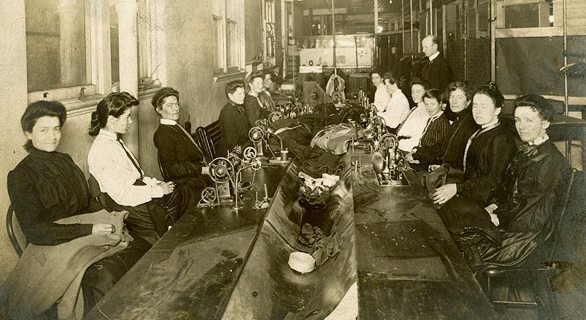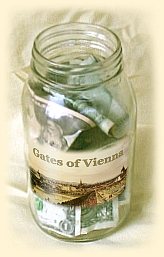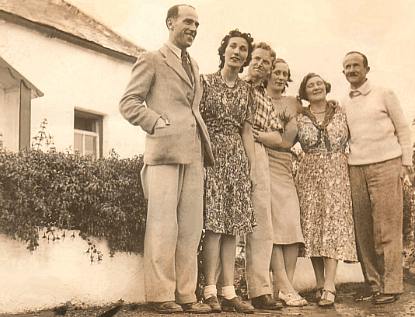
Winter Fundraiser 2014, Day Four
For a long time the Baron has been voting for this theme — “Odd Jobs” — of our checkered careers as a good choice for these week-long fund raisers. After all, if our readers were going to fund part of this undertaking, they deserved some information on the proprietors. Besides, I think he’s rather proud of his perseverance. He’s entitled, methinks.
I’m not sure what made me hesitate; probably my reluctance to face the fact that I’m not healthy or robust enough to ever rejoin the ranks of workers or volunteers in tasks that formerly brought such pleasure. And frankly, I’d rather talk about his work than I would my own. It was not only more varied, but his temperament — an optimism which permits him to live in the sunlight — was less fraught than my own experience.
 So let’s begin with our differences in talent and temperament, since those are basic to who we are no matter what we’re doing.
So let’s begin with our differences in talent and temperament, since those are basic to who we are no matter what we’re doing.
Perhaps this part should have come first, before describing any of the various jobs we had. But after digging through our memories of those times, it now seems important to point out how this most unlikely proposition called the Baron and Dymphna @ The Counterjihad came to be. That means differentiating the components. Even as I write, I feel the Baron ducking as he has to edit this later, and I hear echoes of “too much information” from some of our readers, but c’est la guerre, y’all. For our readers who would rather not know, it’s easy enough to move past this post and on to less Alice-in-Wonderland essays. For the readers who are mystified by some of the glosses I used to save making this any longer than it is already, feel free to ask questions.
Consider this post the basement for a structure from which you can see more coherently the reasons and seasons for the life we built together, a life which improbably ended up as mere prelude to Gates of Vienna. In order to have you standing there on the first floor, first I have to dig the foundation, put in a few joists to hold the thing together, and only then can we get back to all those unlikely jobs.
Beginnings
The Baron describes his family of origin as “boring”. By that he means no dramas, no secrets, no flouncing out of the room or the relationship when the ship hit turbulent waters. His mother went to college, working briefly at a local paper and then as a history teacher before she married his father. The Baron’s dad missed out on college: that pesky Depression meant there was no money to attend Williams College, where his own father had studied. And then the war came along and sent millions of men scattering in new directions, at least the ones who survived. For his dad, the army decided, in its infinite wisdom, to send him south, to Virginia, and based on his aptitude tests, to put him in a new division of military work: intelligence-gathering (or more specifically, cryptography). The Baron never knew exactly what his father did except that he couldn’t talk about it to his family. The job required that the family move to England while when the B was set to begin high school. Once stationed there, his parents decided their son should attend a local school rather than the alternative American version.
Their family took annual vacations which he remembers fondly; his father and the Baron enjoyed sharing the Guardian crossword puzzle and other brain-teasers. His mother liked being a wife and mother in a period when that was an acceptable ‘job’. She also liked bird-watching and sewing.
On both sides of his family the Baron was American back to the beginning. His father’s New England forebears were not penurious when they arrived straight from England. The family lived for generations in Massachusetts; some still do, and he has the variously updated genealogy books to prove these antecedents. His mother’s family, Virginian to the bone, had once owned slaves — not a proud fact, but for most old-time Southerners it’s a reality. The family also included Civil War heroes and a mixture of German, Scots, French, and Lord-knows-what-else — all safely WASP, however. Well, maybe not so safely A-S, with those annoying Celts and Franks and Teutons — but definitely no Papists in the mix.
I believe he did find a maternal cousin, once removed, who was known to have had a “problem with drink”. And if I have the story right, a great-grandfather ran off to West Virginia to run a casino and acquired a common-law wife. In a small Virginia town, that must’ve raised some eyebrows — though this rake continued to support his real family, of course. Things were different then.
The B finished his A-Levels in Yorkshire before returning to America to William and Mary, the same college his mother had attended. He says he missed honeysuckle and turtles and lightning bugs too much to have seriously considered Oxbridge or a deeply academic life.
In that we are similar. I’m an “intellectual”, but graduate studies were stifling, though I did consider it before divorce and the ruination of my first family left me destitute and eventually disabled.
Because of his ‘boring’ upbringing, the Baron was, at long last, a welcome refuge for me, though it took us both a long time to understand how deeply skewed was my soul. I’m still learning.

My mother came over to the American continent by boat, landing in New York City in 1940, sailing on the last boat out of Liverpool. it was stalked in international waters by U-boats, but my mother was sure “nothing would happen”. Eight months earlier, she’d married a wealthy American after a “whirlwind” courtship in 1939. Their life in Ireland post-marriage seems to have consisted of extended stays in the ‘county’ homes of people who rode to the hounds and played golf. My beautiful, graceful mother was out of her middle-class element — busy learning which fork to use and which vowel would serve to get her past any conversational gaffes.
But then again, as we pieced it together in her last year while she lived with us, she’d likely been in shock from 1939 onwards. The mind-numbing experience of having her Victorian, strait-laced father die in her arms from a sudden heart attack caused her to shut down emotionally. From fragments of conversations over the years I realized she’d never have been permitted to marry this impulsive, fast-talking Irish-American if her father had still been there to oversee things. That’s what fathers do. Or at least they did so back then.
But Da was irrevocably gone and my lovely ditzy mother was presented with an opportunity to escape the confines of her suffocating, pinched middle class Dublin life with its inhuman baggage of shame. So she lied to herself about her Prince Charming’s charms. Now I understand.
Their aimless existence as guests in county estates always sounded a bit like Mrs. Simpson and the abdicated king, though on a lesser scale. Mother learned to ride after a fashion, and played tennis for the first time. My father wrecked Jaguars; one supposes it was the done thing in those circles. Or at least no one told my mother otherwise.
The war was certainly looming larger by then. Ireland was neutral, but my father’s American citizenship was a consideration. The family, trying once more to ‘straighten him out’ decided a managerial position in one of the Canadian branches would serve to keep him out of trouble. Or at least out of Ireland. It’s too bad they didn’t offer the position to my mother: she later turned out to be a fine manager. Instead my parents landed in Canada and she went to work for the Hudson Bay Company while he purportedly “worked”. That always sounded so exotic to me: The Hudson Bay Company. When the Canadian venture failed, they moved on to Florida, where my father had family and where my mother eventually had me.
I’ve never quite put it all together, the chronology of that time, though the Baron’s questions helped me with some of the stray pieces. All I know for sure is what I experienced and it was …unfortunate. The PTSD I experience today probably began in my infancy. Moving from Canada to the other extreme of Florida’s climate meant that my mother was often ill and sometimes hospitalized.
She managed to buy a small house but when the war came she was forced to rent it out for exorbitant sums in order to provide for us. My father was like Leonard Cohen without the songs; Jack Kerouac without the books. A vagabond safely married to a Catholic lass who would never divorce his sorry self. Oh yes, he did have a miserable young life despite his family’s wealth, and he was extraordinarily intelligent. But his rootless life left me unimpressed with unmoored genius.
By the time I was two, Mother had to work to support herself. There was no daycare to be had, and a number of “housekeeper” positions turned out to be old letches who chased Mother around the house. She’d stop long enough to grab me and then she was off, running down the road toward safety…
Then came real jobs for Mother and foster homes for me. Some of them were wonderful; some not so good. Mother found daycare but the long walk home in the heat was making us both sick. By age five my physical symptoms were such that the doctor advised Mother to put me in an orphanage — just until I was old enough to be a latchkey kid, though they didn’t call it that back then. The idea devastated my mother, but she could find no other option. I quickly realized that in order to keep my mother I would have to take care of her, to convince her that I was “okay” and everything was “fine”. Kids know what they have to do to survive.
Thus it was, on a fine day in May, I arrived at Saint Mary’s Home where I would stay for five years. My extreme homesickness was literally gut-wrenching. At night, Sister Isabel would sit with me until I cried myself to sleep. As often as the nuns permitted, Mother took me home for weekends. On Sundays, going back on the city bus, we learned to bring along a travel sickness bag since I threw up all the way into town. It was simply part of my Sunday routine; a price I was willing to pay for the joys of the Fridays and Saturdays taking care of Mother.
Great was the rejoicing when I came home at last. By then, Mother sponsored her two brothers to come to America. If only they’d been able to come earlier… at any rate, their financial help eased the burden, though I quickly came to despise the daily peeling and boiling of mounds of potatoes. Spaghetti? Not at that table! Rice? What was I, Chinese?
As is often the case with children whose attachments have been disrupted repeatedly, I was determined to marry as soon as possible and have my own family. Only then would I be “complete”. After a failed attempt at nursing school (much too similar to Saint Mary’s), I married at age twenty. Having thought carefully about marriage, I knew what kind of father I wanted for my children and what kind of wife I would be: we would have a marriage based on respect and loyalty to one another. Being a good Catholic girl, I wanted a good Catholic boy. He would be dependable and have a good disposition, an even temperament. He’d be someone who liked to laugh but with enough gravitas for us to support one another through the hard times.
Years later when I described my “ideal man” to someone, they told me I was unrealistic, that such men didn’t exist. Funny, though, that’s exactly what I got with the Baron: the young twenty year-old girl knew this “ideal”; I just had to wait seventeen years for him to appear By then I was so scared that for the first two years I kept waiting for the Baron to start breaking things or screaming. Those things never happened.
Unfortunately, though, that was a good description of my experience the first time around. To be fair, I think he started out okay. But as we’re finding out today, mental illness often doesn’t become apparent until the mid-twenties. When we’d been married more than a dozen years, this man uprooted all of us from his extended clan and all that was familiar. He took a job hundreds of miles from friends and friendly routines. It took him a little more than a year before he hit the road in a sports car, flying off to meet his young trophy girlfriend. The children and I were stranded, left to fend for ourselves in the war zone he’d made in this new land where I knew almost no one.
Now I suspect he may have been truly bipolar. Who knows? Or perhaps it was simply the self-medication with alcohol? He’d been clean for a few years when he began drinking again in this strange land…or maybe it was the drugs that caused his increasingly severe Jekyll/Hyde changes? Whatever it was, the children were afraid of him and so was I. Having been told repeatedly that it wasn’t necessary for me to work, since he was a good provider (and he mostly was), the only job I could get that allowed me to be home when the kids returned from school didn’t pay enough to cover the rent. My descent into anxiety and paralysis was inexorable. By the time I met the Baron the children had mostly fled to safer refuges and I was trying to sign myself into a psychiatric hospital.
No man in his right mind would’ve said, “Hey, don’t do that. I’ll help you”. But that’s what the Baron said, and I followed him out the door, away from the doctor.
I really was the Baron’s first odd job.
He helped me shovel out the rented house to get it ready to return to the landlord. He helped me sell or find homes for the accumulated belongings of a once-upon-a-time family. In other words, he helped me finish the job my former husband had begun. My children had scattered to relatives; suddenly there I was with all these maternal nerve endings but with no kids attached to them. It was like brutal amputations without anesthesia. Much as soldiers complain about the sensation of phantom limbs, I had phantom children. Excruciating.
The Baron moved my few remaining belongings and me to his house in the country. I was scared. From eleven large rooms to what, three? And one small bath. No air-conditioning. No neighbors for coffee. No sidewalks for jogging. In the beginning I mostly slept. The Baron would wake me up and make me take Vitamin B. We ate a lot of brown rice, I remember. And beans. Tuna fish casserole.
He loved poetry and could recite reams of it. He painted amazing pictures. He explained to me that my children and I were blessed with a wonderful wit, a brilliant sense of humor. He opined as how that might have saved us.
We went swimming in the river…and within a few weeks, I began applying for jobs. All my friends were gone, but the Baron’s friends were accepting of me. I spent a lot of time in fugue states…
One Sunday morning the Baron had gone painting and I heard noises in the front yard. Bells? Oh, we had visitors! I ran to the front door and walked onto the porch. There in the vegetable garden were three cows, munching on our bush peas…
This new life was going to take some adjustment….
To be continued…
[What?? You think I’d leave you hanging? Just wait till we get to my longest job, the one where I’m in the police car and an officer is telling the woman I’m helping that she needs to get a gun…]
Yesterday’s donors who clinked the tip cup checked in from:
Stateside: California, Georgia, Michigan, New Jersey, New York, Pennsylvania, Tennessee, and Virginia
Near Abroad: Canada
Far Abroad: Australia, France, Germany, Sweden, and the UK
Thank you all for heeding our call. You’re proof that the spirit of the West is alive and well.

The tip jar in the text above is just for decoration. To donate, click the tin cup on our sidebar, or the donate button, on the main page. If you prefer a monthly subscription, click the “subscribe” button.

Keep going!
Please Mum, I want more!
You have a wonderful way with words…..I’m now hungry for the rest of your life adventure.
Well, I’ll be. My elder son’s a Williams grad, too!
The last time I noticed Williams College, it had sadly become all corseted with p.c. strictures.
“On both sides of his family the Baron was American back to the beginning.”
Were you named after the ship, or was the ship named after you?